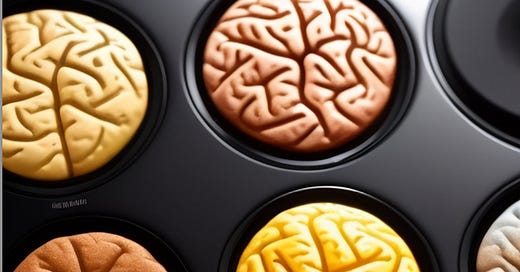
Dear Reader
Here’s a thought from the Persian poet Rumi that has illuminated my dark solstice this week:
“Sell your cleverness and buy bewilderment.”
It sounded like a formula for a good Christmas break to me. So, this edition was compiled mostly in cleverness-mode and is being edited in bewildered-mode. Make of that what you will. I’ll let the results whimper for themselves…
Quaker notes
There’s a beautiful piece about social media and attention and the idea of the public square by Ezra Klein in the New York Times. draws from practices of the Quakers on reflection and contemplation in decision-making, “The Great Delusion Behind Twitter”:
I think there is a reason that so little has gotten better and so much has gotten worse. It is this: The cost of so much connection and information has been the deterioration of our capacity for attention and reflection. And it is the quality of our attention and reflection that matters most.
Take on its own advice and spend some time to reflect on what it is saying. I’m still turning it over and think I will go back and read it again...
Create your own artist collaborations
The gift that technology gave this year was massively powerful image generating apps that turn ideas and words into pictures.
A new one focused on creating photos came out this week: Lexica Aperture Photo , which you can have fun with. It might even provide new parlour games for festive parties. I put this one to work on making dream artist collaborations, mixing up Bridget Riley, Jackson Pollock for instance brought forth (among other things this:
And then Bridget Riley x Grayson Perry delivered this:
I kind of like them…
Lastly, just for giggles, here’s a Dior Streetwear take on spacesuits.
Actually useful AI text tools, No. 1
Yes you do need an app that argues with your phone company about your bill until they reduce it:

No alcohol beer
I’m not a football (or Budweiser) fan but I personally have yet to make my peace with non-alcoholic beer. I agree with this Australian gentleman’s assessment after being forced to watch World Cup football in Qatar WHILE SOBER:
“I find water more refreshing,” he said, “and it gives me the same alcohol content.
Source: NYT.
Dominance of reality
If your brain likes abstract music or art sometimes, it’s because it provides momentary relief from “the dominance of reality”.
This delightful phrase came up in an FT Weekend podcast “Why your brain craves Despacito”. Sound-engineer turned neuroscientist Susan Rogers was talking about her book This Is What It Sounds Like. Rogers got her break developing the sound for Prince on his seminal Purple Rain album and many others. In 2000 she changed career to study the science of music and what it does to our minds.
Different types of music appeal to different kinds of brains, for different reasons, depending on what any given brain wants. We’re attracted to people with similar brains, so maybe that’s another layer of why fans of a certain band or genre come together. When it comes to your brain, you really have found your Brain Tribe when you go to a club or a concert of music you love.
One thing Rogers said that keeps resonating for me – almost literally, echoing the original moment of insight – is the reason that some people enjoy abstract music (which is a broad category, as it was being discussed with reference to Ann LCD Soundsystem song, “Dance Yourself Clean”). Abstract music – and other – free the brain from “the dominance of reality”, a deeply evocative phrase. It’s like taking a break from the chatter and data flows into your mind, – a way to set your brain free from thinking about reality, of constantly making sense of things. Look at a Rothko painting and you have to just feel things, experience it. There’s nothing there for the logical, analytical engines of the mind to get a purchase on – the wheels of rationality spin and you just are there with the colours and the sounds and the feelings.
The phrase dominance of reality comes from a paper by Vered Aviv a researcher in neuroesthetics [yes, first time I’ve seen that word too] at the Jerusalem Academy of Music and Dance:
abstract art frees our brain from the dominance of reality, enabling it to flow within its inner states, create new emotional and cognitive associations, and activate brain-states that are otherwise harder to access. This process is apparently rewarding as it enables the exploration of yet undiscovered inner territories of the viewer’s brain.
I can’t wait to find out more.
A Freudian slip is…
…when you say something but you mean your mother.
Thanks to
...Actually useful AI tools, No. 2
For people with literacy or learning difficulties who need to communicate by email or texts – this app turns their one sentence into a polite message:


Shock news: Meta predicts Meta is the future of work
Dominance of reality isn’t something that overly bothers the Meta future trends writers. In report from the company on the future of work, there was an unsurprisingly large amount of stress placed on the role that “the Metaverse”, a construct so vague it includes the most popular online games and expensive headsets too heavy and painful for people to wear for more than an hour.
The argument isn’t a bad one. People are working from home much more, which can lead to feelings of isolation and the sense of presence that virtual reality provides can help them.
Throughout my career, I’ve been working with companies that advocate for video-meetings and telepresence, but it took the shock of the pandemic to bring about mass adoption of technology which had been available for at least the past two decades. I had a webcam on the super-cute Sony Vaio laptop I was toting in 2002, for instance. Bad webinar software had to be downloaded every time there was a meeting with clients at companies like Cisco etc.
So, we might ask, what convergence of dramatic disruptive events and cheaper, lighter better tech will it take for meetings in “the metaverse” to take place. By the time that happens, I would not be surprised if “metaverse” sounded about as old fashioned as “IP telephony” and “telepresence meeting” sound today. And despite the long miles that Meta may have travelled, it’s name could be as synonymous with this form of technology as Skype or WebEx is for today’s workers who aren’t mandated to use those systems.
(Hat tip to Andrew Tenzer)
The “Steve Jobs was a monster and so can you” trope
Bloomberg columnist Adrian Wooldridge asks the useful question in the age of empathetic management: aren’t autocratic bullies really good bosses sometimes? Elon Musk, Henry Ford and IBM’s T J Watson were/are awful people but they achieved great things:
They need to be willing to stick to their vision even when everybody tells them that they are nuts. And they need to create organizations that will turn that vision into reality. Doing all these things requires the personality traits of the autocrat rather than the servant-leader or empathizer-in-chief: stubbornness, arrogance, monomania, a willingness to turn other people into objects of your will.
And, oh the stories of T J Watson, who ran IBM:
He demanded not just obedience but complete adulation. In the IBM Rally Song, employees sang about his virtues: “The name of T. J. Watson means a courage none can stem/And we feel honored to be here to toast the ‘IBM’.” There were regular lengthy awards ceremonies in which his employees gave him awards for his various achievements.
Then the piece moves on to Steve Jobs. This is not a nuanced view of jobs. Which throws the rest of the analysis into doubt:
Steve Jobs was a more recent example of the imperialism of the soul. Egotistical and moody, he wouldn’t accept anything less than total devotion from his employees.
Steve Jobs was, at certain points in his life, a complete dick. But no one expects anyone not to have occasional flights of being-a-dick in their lives. Hell, I imagine there people who would think I was an one from time to time, and according to my ego nothing’s ever my fault and the gods put me on earth as a gift to the species.
But there are so many people, especially from Steve Jobs’s second and third acts (wilderness years/Pixar and the Return of the King phase at Apple) that reject the idea that he was a tyrant. A pirate, yes, but a tyrant – no. I heard Ed Catmull talk candidly to CEOs of other big companies about what Jobs was like – and he paints a picture of a collaborator who prized teamship and challenge to his ideas. A recent discussion about Steve Jobs’s legacy with Jony Ive, Tim Cook and Laurene Powell they talked about his intensity of focus, and willingness to have an argument in order to bring about better ideas. But he was someone who would listen to counterpoints and change tack when he knew he had been wrong. Famously he thought the idea of an Apple phone was terrible, and an Apple tablet and both the Apple Store the App Store at different points. And yet these brilliant ideas and innovations broke through and were part of the greatest corporate comeback of all time.
But in the end he was – at times – an autocrat. I think it’s more useful to think in terms of war-time CEO / peacetime CEO, as Ben Horowitz talks about. Sometimes decisiveness has more benefits than building consensus. It comes at a cost, though, and one which isn’t always obvious at the time. Even more painfully, sometimes the costs have to paid before the success of the leader’s actions begin to manifest. Now those can be dark moments…
Award winning ad campaign in Russia
Shout out to Rob Blackie and a rag-tag group of brilliant people who have picked up a well-deserved gong this week for social innovation from The Drum awards for their work using targeted ads to spread counter-disinformation (a.k.a. accurate news) inside Russia. If you would like to make a donation or find out more – click below:
That’s all for this week
Thank you as ever for reading, liking and sharing Antonym with others. It’s been a lot of fun writing this year.
Antony










